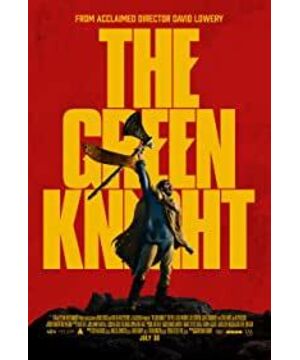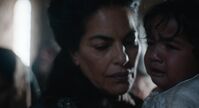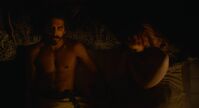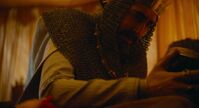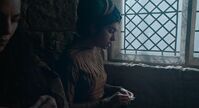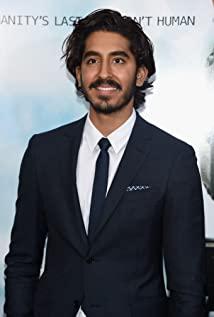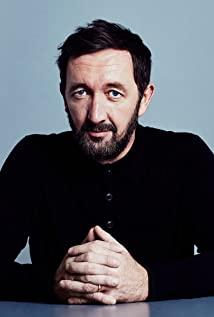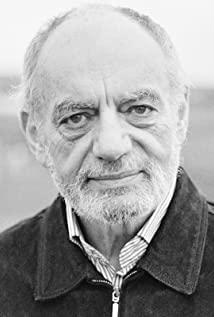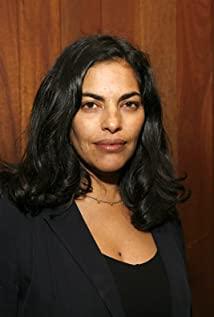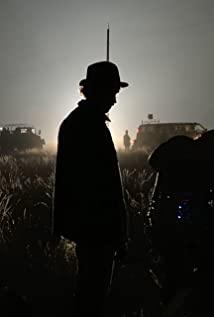"The Green Knight" produced by A24 is finally on.
Based on the 14th century poem "Sir Gawain and the Green Knight ", the film tells the story of Gawain's journey to become a knight against the backdrop of King Arthur and the Knights of the Round Table.
The film's final scene cancels the triumphant ending in the original poem and replaces it with an open-ended ending, leaving Gawain's fate in the hands of the Green Knight to the audience's interpretation.
The whole movie is more of a fable about a boy becoming a knight. In this story, Gawain tries to explore and prove his honor, persuaded by King Arthur and his mother to complete the Christmas promise made with the Green Knight.
The rhythm of the film is extremely slow, the symbolic imagery, and the incomprehensible dialogue are enough to make it difficult for many audiences to accept. The audio-visual language is cold and gorgeous and haunting, and at times equally creepy, and I personally stick to it mainly because of the aesthetics of the film.
The following is an interview with director David Lowery and star Dev Patel by reporters from entertainment newspaper Thrillist.
Original link: https://www.thrillist.com/entertainment/nation/the-green-knight-ending-explained
Reporter: I have a friend who really likes King Arthur stuff, and I texted her right away when I saw this and said, "You gotta go check it out!"
Director David Lowery: I hope all Medievalists and Arthurian fans can watch this movie. This has been one of my secret hopes, and despite all the inconsistencies and changes, we'd love to have the approval of people who have dedicated their lives to these things.
Reporter: I actually wanted to ask how much you are immersed in Arthurian mythology and literature. Or do you just follow what you want to do with this particular story?
Director David Lowe: It can be said that it is a shallow taste. I could have done more research, but the film went so fast I didn't even have time to do all the research I wanted on the poem.
I'm doing enough where I now know what I'm doing. I know what some of the changes I've made may have an impact, and I know what I'm doing. I'm also afraid that I won't do justice to such a canonical work.
Some adjustments are arguably just whims. Soon this whim became a burden on my shoulders, and I realized there was a reason it was a 700-year-old piece.
If I screw up...I can't count on being neutral and impartial, I hope I'm just touching the density of the original poem in a proper way. I took it with me and it was what I expected of myself from the first draft of the script to its completion last October. Hope there's a lot in it.
I've tried to show the breadth of this history, although we can't include it all, hopefully it will resonate with some.
Reporter: I think it works in a really interesting way because you go into the story a little bit obliquely. Dev, what drew you to the role of Gawain?
Starring Dev Patel: A few things. I mean, mostly working with David. I like his work very much. To me, he's a real director, and he's also a chameleon in terms of the type of films he makes. His script fascinates me. After a few weeks, certain images came to my mind. I just can't shake it. I could really dedicate myself to it.
[Gao Wen is] a young man, he has big flaws. He's on this doomed mission, there's a real physicality to that journey, and I think that's going to be great.
I can have a lot of parallels with my journey in this industry, trying to be an actor, what it all means, trying to be honest in that ambition.
Reporter: You take a lot of these pictures in a very large outdoor space. The poem glosses over the many trips and adventures and other things he's been through before reaching the mansion and church, but here you can see all the villains, ghosts, giants, and landscapes Gawain encountered.
Director Lowe: I really like that the characters in the movie are walking through the landscape for a long time during their journey. I'm a big Bela Tarr fan, a big Tarkovsky fan, and I love Gus Van Sant.
If you gave me a dolly shot of a 10-minute long character walking, I'd be a happy moviegoer. And then, it's a movie about a guy on a journey, and I'm kidding myself if I don't just watch some clips of that journey and watch him go and then trek through that landscape. But I also like the plot structure of the mission narrative. I love the stops along the way.
When reading the original poem, there are these inferences about giants, battles, and snakes. We don't have snakes, but we have giants. There's also a mention of going through Holyhead, a place in North Wales that you can go to today, the shrine of the decapitated saint whose head was thrown into a spring , and then magically reconnects according to the legend. I just want to dig into this stuff.
The story we told resonated so much, not just beheading, but chivalry, honor and respect for others that I could express, so it felt like he was building a chapter out of that. And all other chapters are also based on inferences in the text or inferences from Arthurian legends mentioned in the text.
I wrote the script while I was reading the original, so a lot of times I thought about the original line in the poem, like the one about Holyhead, and realized there was a chapter left to cover, and realized that was a lot more important. I should also take this sequence very seriously.
But yeah, it really just finds those little lines. I love that you can use this poem as a map of Wales at the time. You can start from Camelot and follow the entire journey to the Green Church. There are enough references to specific geographies that you can continue this journey as Gawain did and follow in his footsteps which is a wonderful thing and the poem has so much detail that you can actually use it builds the map.
Reporter: The film is filled with many beautiful and bizarre scenes that paved the way for Gawain's journey. Is there a specific scene that any of you are really excited about or eager to shoot?
Director Lowe: I mean, the whole Green Knight scene, was the last we shot. This must have been hanging over our heads because it was so big that we didn't have much time to shoot. So, it's very exciting because we're in this incredible set that [production designer] Jade Healy built. We had Ralph [Ineson] on a horse and Sean Harris gave this incredible speech, which was also scary because we only had a few days to shoot all of this. Seeing this come to fruition, watching Gawain and the Green Knight face off was incredible. That's where the whole story started, see the original dialogue.
There are no visuals for that scene, the set is real, the green knight is real - except that his head is chopped off. Over the course of these three or four days, it performed spectacularly on stage, and it was incredible to see it come to fruition. But it's also scary because we were filming and realizing the importance of that scene and realizing, oh, we barely had enough time to shoot. There were pressure cookers back then. Dev, I don't know how much you remember, all the scheduling was difficult, Kate [Dickie] and Sean both had to pack up to see other movies, so we had to shoot all their parts first. It's been a crazy ride in our last days shooting this stuff.
Starring Dev Patel: There are two special scenes, one that's obviously a climactic scene, because we're trying to navigate so many different emotions without giving up too much.
I feel like I'm a little tadpole and I've been swimming up to this moment. This put a lot of pressure on me.
And, spoiler alert, I should say, I guess, but as we travel through time, we arrive [Gawain] is an older king, and we shot part of it early on in the shoot.
So, in the course of a day's production, the first thing I do is that. It's really scary to me because of physical fitness and the idea of achieving everything you want, or success but it's built on a lie and it's really funny to see the dream unfold in a negative way. I want him to feel broken and bored, totally different from these stronger guys. So that's something that I often replay in my head. We have a great makeup team to really help with this transition.
Reporter: Well, your anxiety really paid off because they were the two best parts of the whole thing.
Director Lowe: The entire opening sequence of the Green Knight, The King, and The Christmas Feast, I spent over a year editing it just to get it right because there was so much going on in the script. It was like six pages long and the first cut was 40 minutes. It's really like, "Oh, we have to get this land right."
Reporter: Regarding the last scene, in this film, you stop right at the end of the poem. In the original, he came home victorious and told everyone what happened. But the movie stops before that, and instead, you get to see what your life would be like if you failed. Why stop there?
Director Lowe: I always tell the prep people that if we do our job right, we can have Gawain beheaded at the end of the movie and it will be a happy ending. I think we did.
I think we could end the movie this way (like the end of the poem), but it would be redundant, spoiler alert, since we just saw it happen in the visual. And I just don't think that image is the one we need to end the movie with.
I want to leave it hanging. I want to leave it to the audience. Was it sent happily as in the original poem with scratches on his face? Or has he met his doom?
I think both endings apply. We place equal trust in both interpretations. But no matter how you interpret the finale, the final frame, it ended with a happy ending, with a happy ending, and he got where he needed to be. Whether that means he's dead or not, he'll die one day. If he dies, he achieves the integrity that the movie lacks at the beginning, which is a good thing. So it's a happy ending.
Reporter: It seems to be more about his journey to really understand chivalry and do it right than, if you make it, here's your reward.
Director Lowe: Exactly, exactly.
David Lowery (David Lowery), American director, was born in Wisconsin in 1980, and his representative works include "A Ghost Story" and "Pete's Dragon".
Dev Patel is an English actor best known for the 2008 film Slumdog Millionaire directed by British director Danny Boyle.
View more about The Green Knight reviews


